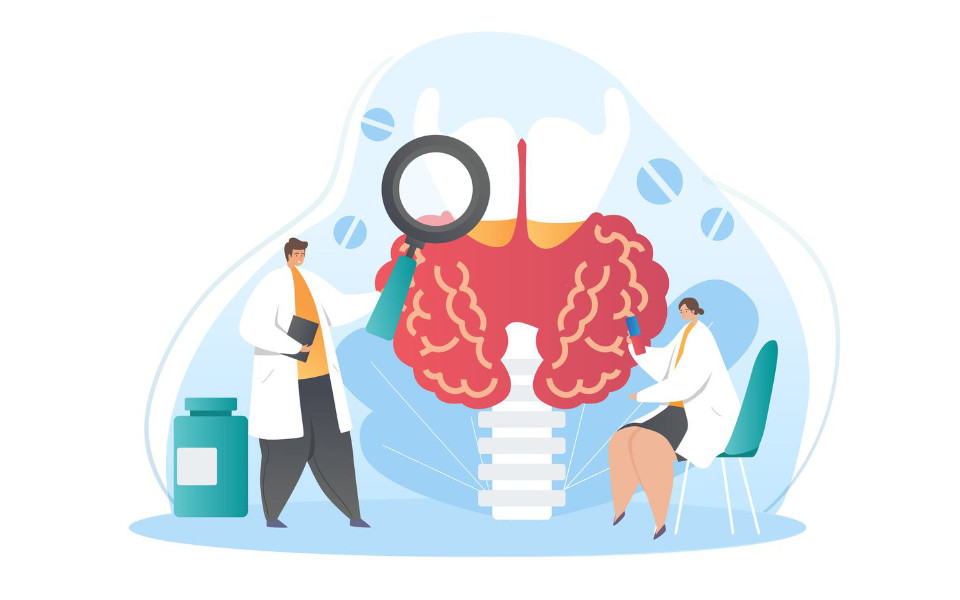Thyroid problems, whether they be underactive or overactive, may lead to a variety of uncomfortable symptoms. Hashimoto’s thyroiditis, Graves’ disease, an enlarged thyroid (goiter), and thyroid nodules are the four most prevalent thyroid conditions.
What Is the Thyroid?
The little thyroid gland may be found near the front of the neck, around the windpipe (trachea). It has the form of a butterfly, with a narrow body and two large wings that wrap around the side of your neck and trachea. Thyroid functions as a gland. All across your body are glands that, when stimulated, produce and secrete compounds that aid in the operation of various organs and systems. Hormones produced by your thyroid play a role in regulating several essential bodily processes.
Thyroid dysfunction may have far-reaching effects on health. Hyperthyroidism occurs when the body produces an extreme amount of thyroid hormone. Hypothyroidism occurs when the thyroid hormone is not produced in enough amounts by the body. The two disorders are equally critical and need medical attention.
Diseases of the Thyroid

Hormones created and produced by the thyroid have an impact on many different bodily functions. Thyroid illness is diagnosed when the thyroid gland either overproduces or underproduces these vital hormones. Different forms of thyroid illness exist, such as hyperthyroidism, hypothyroidism, thyroiditis, and Hashimoto’s thyroiditis.
Thyroid illness is any medical disorder that prevents the thyroid from producing enough hormones the body needs. Your thyroid often produces hormones that maintain healthy bodily function. When the thyroid produces an excess thyroid hormone, the body speeds up its metabolic rate. What you’re experiencing is known as hyperthyroidism.
Too rapid an energy expenditure will result in fatigue, increased heart rate, unintentional weight loss, and heightened anxiety. The opposite condition, low thyroid hormone production, may also occur. To put it simply, you have hypothyroidism. Fatigue, weight gain, and an inability to handle colds are some side effects of low thyroid hormone levels.
Causes for Thyroid Issues
When the thyroid gland either produces too much hormone (hyperthyroidism) or not enough (hypothyroidism), several issues may develop (hypothyroidism).
Thyroid problems, whether they be underactive or overactive, may lead to a variety of uncomfortable symptoms.
Hashimoto’s thyroiditis, Graves’ disease, goiter (enlarged thyroid), and thyroid nodules are the four most frequent thyroid conditions. Read on to learn more about the many thyroid illnesses and diseases, how they manifest, and how they may be treated.
Who typically announces a thyroid disorder?
Anyone of any age, both genders, and at any stage of development or life span may be diagnosed with a thyroid disorder. Both congenital (usually in the form of hypothyroidism) and acquired forms are possible (often after menopause in women).
Around 20 million Americans are affected by a thyroid issue, making it one of the most prevalent endocrine diseases. The likelihood of a woman being diagnosed with a thyroid issue is five to eight times higher than that of a male.
Increased chance of getting thyroid illness includes:
- Have a history of thyroid problems in your family?
- Possess a medical disease (such as pernicious anemia, type 1 diabetes, primary adrenal insufficiency, lupus, rheumatoid arthritis, Sjögren’s syndrome, or Turner syndrome).
- Use an iodine-rich pharmaceutical (amiodarone).
- Having a minimum age of 60 is particularly true for women.
- Experienced thyroid disease or cancer in the past and received treatment (thyroidectomy or radiation).
What Are the Most Typical Symptoms of Thyroid Disease?
You may suffer a wide range of symptoms if you have a thyroid disorder. The symptoms of a thyroid disorder are frequently difficult to distinguish from those of other diseases and ages. This might make it hard to determine whether or not your symptoms are due to a problem with your thyroid.
Thyroid illness symptoms often fall into one of two categories: those caused by an excess of thyroid hormone (hyperthyroidism) or a deficiency of thyroid hormone (hypothyroidism) (hypothyroidism).
1. Signs of hyperthyroidism, or an overactive thyroid, include:
- Feeling worried, tense, and edgy.
- Not sleeping.
- Attempting to reduce body fat.
- Experiencing goiter or a swollen thyroid.
- With a lack of strength and trembling muscles.
- Menstrual cycle disruption or absence of menstruation.
- Feeling overheated and uncomfortable.
- Having trouble seeing clearly or experiencing discomfort in the eyes.
2. Underactive thyroid (hypothyroidism) may cause a variety of symptoms:
- Tired out (fatigue).
- Putting on weight.
- Having difficulty remembering things.
- Suffering from heavy menstrual cycles regularly.
- Having hair that is dry and coarse.
- Suffering from a raspy or hoarse voice.
- Being uncomfortably uncomfortable in cold weather.
Hyperthyroidism

The overactivity of the thyroid gland is known as hyperthyroidism. As a result, there is an excess of thyroid hormone. All sorts of bodily processes may quicken as a result of this.
Seventy percent of those with an overactive thyroid have it because of Graves’ disease. When the thyroid develops nodules, a disease known as toxic nodular goiter or multinodular goiter, the gland may overproduce hormones.
Hyperthyroidism can also be caused by the following:
- Disorders of the thyroid gland.
- An excessive intake of iodine.
- Medicine overuse syndrome is caused by overuse of thyroid hormone.
- Nodules on the thyroid that are hyperactive are called toxic nodular goiter.
- Malignant tumor of the pituitary gland.
1. Hyperthyroidism symptoms
Symptoms of hyperthyroidism may include, but are not limited to:
- Restlessness.
- Nervousness.
- A rapid heartbeat accompanied by agitation.
- Hyperhidrosis, trembling, insomnia, and fragile skin are anxiety symptoms.
- Dry, brittle hair and nails.
- Weakness in the muscles.
- Shedding pounds.
- Enhanced hunger.
- Having a lot of bathroom breaks.
- Eyeballs that protrude (in Graves’ illness).
2. Hyperthyroidism diagnosis and treatment
A doctor may diagnose hyperthyroidism by measuring your thyroid hormone levels or determining how well your thyroid functions.
Thyroxine (T4) and stimulating thyroid hormone (TSH) levels are determined using a blood test. Hormone production by your thyroid is prompted by a hormone secreted by your pituitary gland called TSH. Thyroid overactivity may manifest itself in high thyroxine and low TSH readings.
It is also possible to have your doctor provide radioactive iodine by oral or intravenous administration and then monitor the amount absorbed by your thyroid. Your thyroid uses iodine to create hormones. Excessive amounts of radioactive iodine indicate that the thyroid gland is functioning abnormally. The radiation at this low level disappears fast and poses little threat to most individuals.
Hyperthyroidism treatments include removing or blocking the thyroid gland’s ability to produce hormones. In terms of treatments, your doctor may advise you on one of several options that are available:
a. Medication to suppress the thyroid
Drugs like methimazole (Tapazole) that inhibit thyroid hormone production may help alleviate symptoms.
b. Radioiodine treatment
The thyroid gland is negatively affected by a high dosage of radioactive iodine. You may swallow the tablet or drink the liquid form. If your thyroid gland absorbs iodine, it will also absorb radioactive iodine, which may cause cancer. But pregnant and nursing women shouldn’t choose this choice.
c. Beta-blockers
A reduction in symptoms is possible with the use of beta-blockers.
d. Surgery
Thyroidectomy is surgery to remove the thyroid gland. As a result, your thyroid function may return to normal.
Hypothyroidism
Hyperthyroidism is the reverse of hypothyroidism. Your thyroid is underproducing its hormones because it is underactive. Some of your body’s processes may become less efficient as a result.
Some common reasons people get hypothyroidism include radiation therapy, surgery to remove the thyroid gland, and Hashimoto’s thyroiditis.
Further potential causes include
- Thyroiditis.
- You may be born with hypothyroidism or congenital hypothyroidism.
- Lack of iodine.
- Diseases of the hypothalamus and pituitary.
- Prescription drugs such as those used to treat heart disease, cancer, and bipolar disorder.
If you also suffer from illnesses like celiac disease, diabetes type 1 or 2, rheumatoid arthritis, or lupus, your risk of developing this disorder may increase.
1. Hypothyroidism symptoms
Symptoms of low thyroid hormone production include:
- Fatigue.
- The condition of having dry skin and hair.
- Increased sensitivity to chills.
- Challenges in recalling information.
- Constipation.
- Depression.
- Intense weight gain.
- Discomfort or weakness in the muscles or joints.
- Sluggish heartbeat.
- Periods that are both heavy and erratic.
- Suboptimal sperm count.
- Coma.
2. Recognizing and treating hypothyroidism
Blood testing and imaging scans help doctors identify hypothyroidism. Your doctor will check your TSH and thyroid hormone levels using blood testing. If your TSH is high yet thyroxine is low, you may have an underactive thyroid. The pituitary gland may be trying to encourage the thyroid gland to produce its hormone by releasing more TSH, as shown in these levels.
Ultrasounds and radioactive iodine scans are examples of imaging procedures that may be used to evaluate thyroid health.
Hypothyroidism is often treated with thyroid hormone tablets. Symptoms of hyperthyroidism may develop if the thyroid hormone dose is incorrectly administered. Pregnant women with hypothyroidism may need more frequent or stronger dosing.
The Most Frequent Thyroid Issues

1. Hashimoto’s thyroiditis
Chronic lymphocytic thyroiditis, or Hashimoto’s disease, is a thyroid inflammation. Approximately 5% of the U.S. population has hypothyroidism due to this condition. Although it may happen to anybody, middle-aged women are disproportionately affected. In this situation, the immune system gradually kills the thyroid gland and the body’s capacity to generate hormones because it is incorrectly attacking the gland.
Those with mild Hashimoto thyroiditis may show no symptoms at all. Symptoms are frequently mild, and the illness might last for years. They are also non-specific, meaning that a wide variety of different diseases might cause them.
a. Symptoms of Hashimoto’s thyroiditis
Symptoms that are common include
- Fatigue.
- Depression.
- Fatigue.
- Paleness, puffy face.
- Heavy and irregular menstruation if you menstruate.
- Intolerance to cold.
- Enlarged thyroid or goiter.
b. Diagnosis and management of Hashimoto’s thyroiditis
Thyroid-stimulating hormone (TSH) testing is often used as a first step in diagnosing thyroid disease. If you present with any of the symptoms above, your doctor may prescribe a blood test to look for elevated TSH and low thyroid hormone (T3 or T4) levels. A blood test would also reveal aberrant antibodies that might be attacking your thyroid because Hashimoto’s thyroiditis is an autoimmune illness.
Hashimoto’s thyroiditis is a condition for which there is currently no treatment. To increase thyroid hormone or decrease TSH levels, hormone-replacing medicine is often employed. The disease’s symptoms may potentially improve. The sluggish rate of progression means that the illness is often detected early and may stay stable for years.
2. The illness of Graves
Over 150 years ago, a physician named Albert Graves initially characterized what is now known as Graves’ illness. About 1 in 200 people in the United States have hyperthyroidism due to this condition, making it the most prevalent cause.
When your immune system targets your thyroid inadvertently, you have Graves’ disease, an autoimmune illness. Due to this, your gland may create an excess of the hormone that controls your metabolism.
There is no age limit on developing this genetic condition. According to the U.S. Department of Health and Human Services, it most often affects women between the ages of 20 and 30.
Additional danger causes may involve:
- Origin tale.
- Stress.
- Pregnancy.
- Smoking.
Previous infection with the Epstein-Barr virus (EBV), the causative agent of infectious mononucleosis (commonly known as mono).
a. Symptoms of Graves’ illness
High levels of thyroid hormone in the circulation may cause the body’s systems to work too quickly, leading to the signs and symptoms of hyperthyroidism. Such things may include:
- Anxiety.
- Irritability.
- Fatigue.
- A little shakiness in the hands.
- Elevated or erratic heart rate.
- Hyperhidrosis, or excessive sweating.
- Problems falling asleep.
- Accidental thinning.
- Diarrhea and frequent bowel motions.
- Menstruation changes the menstrual cycle.
- Goiter.
b. Recognizing and treating Graves’ illness
Doctors often use tests like these to identify Graves’ disease:
1. The patient undergoes a physical:
Symptoms of a brisk metabolism include a quick heart rate, elevated blood pressure, and other physical indicators such as a swollen thyroid and protruding eyes.
2. Checks of the blood:
High levels of T4 and low levels of TSH are also possible indicators of Graves’ illness. Therefore, a doctor may also request blood tests to look for them.
3. Check using radioactive iodine.
For more precise results, your thyroid’s rate of iodine absorption might be evaluated using a radioactive iodine uptake test. High iodine uptake may be an indicator of Graves’ illness.
c. Evaluation of antigen-antibody reactions
These analyses may detect antibodies characteristic of Graves’ disease.
3. Goiter
An enlarged thyroid gland, or goiter, is not malignant. Iodine deficiency is the leading cause of goiter around the globe. According to a reliable source, there is a goiter in 15.8 percent of the global population. However, this proportion fluctuates widely and is much higher in regions with widespread iodine shortages. Goiter affects 4.7%Trusted Source of the general population in the United States.
Goiter may strike at any time in life and is more common in regions where iodine-rich foods are scarce.
However, iodine deficiency is not the lone cause of goiter. However, goiters may also develop for other reasons.
- The illness of Graves.
- Congenital disability of the thyroid gland.
- Thyroiditis.
- Tumors of the pituitary gland.
- Goiters indicate a thyroid problem, which is more prevalent after age 40 and in females.
- The use of certain medications, pregnancy, and radiation exposure are further dangers.
a. Goiter symptoms
If your goiter isn’t very big, you may not experience any discomfort. When your goiter gets big enough, it might start causing problems. Symptoms like this may include:
- Discomfort due to neck edema or constriction.
- Breathing or swallowing problems.
- Wheeze or cough.
- A harsh or raspy-sounding voice.
b. Diagnosis and treatment of goiter
Tests used to detect hyperthyroidism also help in the diagnosis of goiters.
As part of a regular physical examination, a doctor will examine your neck and ask you to swallow. Thyroid-stimulating hormone (TSH) and antibody levels may be determined by blood testing. Thyroid diseases, a common source of goiter, may now be correctly diagnosed using this data. Thyroid nodules and swelling may be detected using ultrasound.
The symptoms of goiter are what prompt most people to seek treatment. Since a goiter is a common sign of hyperthyroidism, the therapies for both conditions tend to overlap. Thyroid conditions like Graves’ disease are connected with goiters and are thus easily addressed.
Surgery to remove all or part of the thyroid gland, or radioactive iodine therapy, may be necessary for treatment. Goiters aren’t normally the reason for alarm, but they may develop into significant issues if they aren’t addressed. Breathing and swallowing difficulties are two examples of issues that might arise.
4. Thyroid nodules
The thyroid gland sometimes develops growths called nodules. There are around 1% of men and 5% of women with palpable thyroid nodules in iodine-sufficient nations, according to research that divided populations based on gender in 2015.
Thyroid nodules are around four times more prevalent in women than in men, but the incidence of thyroid cancer is roughly twice in males, at eight and four percent, respectively. Nodules on the thyroid, like other thyroid issues, seem to become more common as people age.
Iodine deficiency and Hashimoto’s thyroiditis are only two possible reasons. The nodules may be solid, or they may contain fluid. While most nodules are completely safe, a tiny minority of them may be malignant.
The majority of thyroid nodules are asymptomatic. But if they become too big, you’ll have trouble breathing and swallowing, discomfort in your neck, and maybe a goiter.
a. Thyroid nodule symptoms
Certain nodules may produce a high concentration of thyroid hormone in the blood. If this occurs, you may have signs and symptoms that are similar to those of hyperthyroidism, such as:
- Rapid heartbeat.
- Nervousness.
- Enhanced hunger.
- Shaking.
- Shedding pounds.
- Skin that is cold and wet.
- Fatigue.
- Intense weight gain
- Thin hair.
- Chapped lips.
- Increased susceptibility to chills.
Symptoms might differ if the nodules don’t cause an overproduction of thyroid hormone or hypothyroidism.
b. Thyroid nodule analysis and management
However, more testing will be done by the doctor to be sure. Such things may include:
- Ultrasound technology.
- Other imaging, such as a C.T. scan, may tell whether your trachea or esophagus is being compressed.
- A TSH test and a thyroid scan may determine the presence of hyperthyroidism or hypothyroidism.
- Your nodule may be biopsied with a tiny needle to see whether it is malignant.
Thyroid nodules may be dangerous, although benign ones normally don’t. If the nodule doesn’t alter, doctors may do nothing to get rid of it. A second biopsy and maybe radioactive iodine treatment may be suggested if the lesion continues to expand.
There are seldom ever any cancerous nodules. thyroid cancer accounts for just 4% to 6% of nodules in the thyroid.
Your specific kind of tumor may affect the course of therapy your doctor prescribes. Thyroid nodules may be treated in several ways, some of which include the use of chemotherapy.
1. Surgery:
Thyroid removal surgery may be recommended by your medical doctor.
2. Depleted uranium in iodine:
Depending on the likelihood of a recurrence, this may also be administered following surgery.
3. Treatment using radiation:
Sometimes, radiation treatment is utilized in place of surgery. If you have a bulky disease, a subtype of Hodgkin’s lymphoma, you may be a candidate for external beam radiation treatment.
4. Chemotherapy:
If your cancer has spread to other body regions, your doctors will rarely recommend chemotherapy.
5. Thyroid cancer
While very uncommon overall, thyroid carcinoma is children’s most frequent kind of endocrine cancer. The disease is identified in fewer than one out of every one million children under ten. Teenagers have a somewhat increased risk, with a rate of roughly 15 per million in the age range of 15 to 19.
Thyroid cancer symptoms include:
- A lump in their neck.
- Swollen glands.
- Tight feeling in their neck.
- Trouble breathing or swallowing.
- Hoarse voice.
6. Myxedema coma
Untreated, severe hypothyroidism causes, the following are some of the symptoms:
Alterations in mental status include excessive drowsiness or coma-like states, low body temperature, and a highly swollen tongue. In the winter, and especially after being outside in the cold for an extended period, a myxedema coma is more likely to occur.
7. Thyroid storm
Excessive levels of thyroid hormones cause a medical emergency known as a “thyroid storm.” If you are experiencing any of the following, you should seek immediate medical attention, a heart rate of 140 beats per minute or higher; a temperature of above 101.5 degrees Fahrenheit (38.61 degrees Celsius); symptoms of anxiety or panic.
Thyroid storm symptoms Include:
- Alterations in mental states, such as agitation, confusion, or restlessness.
- Sweating.
- Awareness lapse.
Thyroid Dysfunction Prevention

Hypothyroidism and hyperthyroidism are both very difficult to avoid. Iodine deficiency is a common cause of hypothyroidism in regions where it is prevalent. Since iodine has been added to common salt, this condition is uncommon in the United States.
Graves’ disease, an autoimmune disorder that cannot be prevented, is a common cause of hyperthyroidism. Thyroid hyperactivity may be triggered by ingesting too much of the hormone. Be careful to follow your doctor’s instructions when taking thyroid hormones. Your thyroid may become hyperactive if you consume excessive amounts of iodine-rich foods, such as sea salt, salmon, and seaweed.
Thyroid illness is not always avoidable, but a prompt diagnosis and diligent adherence to therapy may lessen the likelihood of serious problems.
Frequently Asked Questions
1. Is thyroid a serious disease?
Thyroid illness is a chronic ailment that requires ongoing treatment and management for many people throughout their lifetimes. This is usually achieved by taking a drug every day. Over time, you and your doctor will change your treatment plan. Thyroid illness, on the other hand, is typically manageable.
2. What causes a thyroid disorder?
Thyroid diseases may arise from a wide variety of sources. Autoimmune thyroid disease is the leading cause of this condition. In this self-destructive process, the immune system mistakenly targets the thyroid cells. Thyroid dysfunction, including hypo- and hyperthyroidism, results (in hyperthyroidism). The autoimmune hypothyroidism is known as Hashimoto’s thyroiditis. Graves’ illness is the autoimmune type of hyperthyroidism. Another family member might also suffer from thyroid issues or an autoimmune condition.
3. What problems can the thyroid cause?
Thyroid problems, whether they be underactive or overactive, may lead to a variety of uncomfortable symptoms. Hashimoto’s thyroiditis, Graves’ disease, an enlarged thyroid, and thyroid nodules are the four most frequent thyroid conditions.
4. How are thyroid disorders diagnosed?
In addition to looking at your symptoms and asking you some questions, your doctor will also examine your neck to obtain a good understanding of the activity of your thyroid gland. Your doctor, however, can determine your precise thyroid secretory condition with only a little blood. For instance, a lab can use just one blood sample to determine the exact attention of all the relevant hormones. It is possible to determine the pituitary’s activity and whether or not too much or too little T4 and T3 are being released by testing the TSH. In most cases, a single blood test is all that is needed to confirm the diagnosis.
5. Can thyroid disease be cured?
Treatment for any thyroid disease may restore normal thyroid function. However, this usually requires medicine to keep the thyroid functioning normally. Surgery and radioactive iodine therapies, for instance, have a high success rate in curing people with thyroid cancer.
6. What organs are affected by the thyroid?
These hormones control many of the body’s most crucial processes and have far-reaching effects. For example, they influence respiration, heart rate, body composition, digestion, and mental state. Heart, bone, muscle, menstruation, and reproductive issues may all arise with untreated hyperthyroidism.
7. What is the main cause of thyroid cancer?
Several hereditary disorders have been related to thyroid cancer. However, the true etiology of most cases of thyroid cancer is still unknown. In certain ways, thyroid cancer may be caused by alterations in a person’s DNA.
Conclusion
Several distinct conditions affect the thyroid, such as hyperthyroidism, hypothyroidism, thyroiditis, and Hashimoto’s thyroiditis. What is the condition that affects the thyroid the most frequently? Chronic lymphocytic thyroiditis and Hashimoto’s thyroiditis are both names for the same condition. It is the leading cause of hypothyroidism in the United States and affects around 5 out of every 100 people. It may manifest itself at any age, although most cases are seen in middle-aged women.


